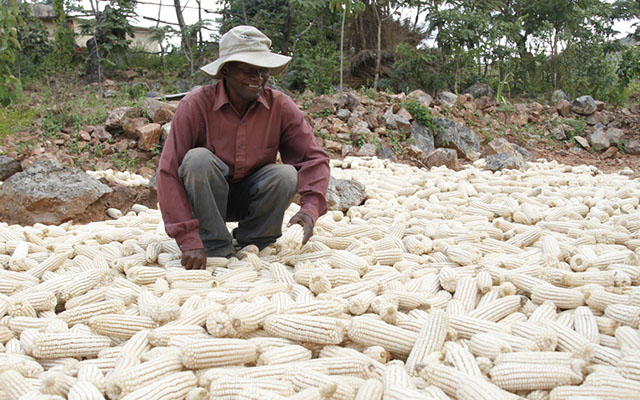‘Involve smallholder farmers in seed production’


Community Technology Development Trust is engaging communal farmers in seed production for crops that include sorghum, pearl millet, groundnuts, and small quantities of hybrid maize
Sifelani Tsiko recently in Mudzi
The involvement of smallholder farmers in seed production could help improve livelihoods and the conservation of indigenous seed varieties, a veteran agronomist and development expert says.
Mr Andrew Mushita, director of Community Technology Development Trust (CTDT), a local NGO, told The Herald recently at the opening of Chimukoko Community Seed Bank in Mudzi district, about 230km east of the capital, that encouraging smallholder farmers to produce seed could boost their earnings and livelihoods.
“The community seed bank is an empowering facility for this community,” he said. “Seed production should not be a preserve for large companies only, even smallholder farmers should be supported to produce seed to enhance the quality of their lives. “Farmers are getting about US$390 per tonne for maize grain and yet maize seed is selling for about $700 a tonne. Small grains are selling for about $500 a tonne. Our smallholder farmers need to be supported to grow their own seed for sale to help them earn more and boost their livelihoods.”
CTDT and Oxfam Novib built the community seed bank at a cost of US$25 000. The local community, traditional leadership and Mudzi Rural District Council also supported the construction of the seed bank, which is expected to enhance food security and improve livelihoods for more than 25 000 people in three wards.
The production of certified seed in Zimbabwe has largely been the domain of large scale commercial farmers due the stringent production requirements, and quality standards that the country has set for the certification of any seed crop.
Mr Mushita said the government needed to create an enabling regulatory environment to encourage smallholder farmers to produce seed for both hybrid and indigenous seed varieties as well as facilitate the marketing and distribution of their seed.
“Seed production is more lucrative and we should be creating an enabling environment to involve smallholder farmers in seed production,” he said.
“This community seed bank should be a hub for farming excellence in Mudzi. We want to end hunger here. Donor dependence belittles people, it’s dehumanizing for our people. Involving our farmers in seed production could be one way out of food insecurity.” Speaking at the same event, Mudzi district administrator Mr John Misi hailed CTDT and its partners for opening the community seed bank.
“We welcome the opening of the seed bank here at Chimukoko,” he said. “It’s an important facility for our farmers and it will help improve livelihoods in our district. It gives us an opportunity to store and have easy access to seed. “Seed is expensive generally and if farmers store their own seed, they cut transport costs and get to grow varieties they know and like. They are not controlled by the market, which may give varieties that are not suitable to our local conditions.”
CTDT is engaging communal farmers in seed production for crops that include sorghum, pearl millet, groundnuts, and small quantities of hybrid maize.
“Many players in the seed industry in Zimbabwe have over the years considered it a high risk undertaking to engage smallholder farmers as seed producers because they think smallholder farmers do not have the capacity (human and financial) and the land (with sufficient isolation distances) to produce certified seed, especially for hybrid maize,” Mushita said. Farmers with support from CTDT recently launched the Champion Farmer Seed Cooperative to empower farmers to produce their own seed and improve their livelihood.
The farmers are drawn from Mudzi, Mutoko, Tsholotsho, Chiredzi and Uzumba-Maramba-Pfungwe. The cooperative company has managed to pool together some 120 tonnes of pearl millet, sorghum and groundnut seed for sale in the 2017–18 cropping season.
“The establishment of Champion Farmer Seed Cooperative Company fits very well with our economic blueprint Zim-Asset, particularly pillar four, which talks about food and nutrition security,” said Mr Ringson Chitsiko, permanent secretary in the Ministry of Agriculture, Mechanisation and Irrigation Development.
“The farmers’ income will improve through selling of seed. Our smallholder farmers will also be capacitated with the technical modalities of quality seed production, certification procedures as demanded by our Seed Act (Chapter 19:13) and the Seed Regulations and Seed (Certification Scheme) notice, 2000.”
The new company is contracting farmers to produce small grain seed, which are often neglected by large seed companies. Agricultural experts say the mainstreaming of indigenous seed production for vegetables and crops into national programmes is critical for the country’s food security particularly now when the country is experiencing the devastating impact of climate change. Most have expressed concern over the erosion of indigenous crop and vegetable germplasm which is important in strengthening the country’s climate change resilience.
Of major concern also was the absence of solid policy frameworks to promote the production of indigenous vegetable seed such as tsunga, nyevhe, mutsine, (okra varieties) derere rebupwe, regusha, rename, renyunje as well as indigenous seed varieties for sorghum, millet, cow peas, pumpkins and a whole range of Zimbabwean crop diversity.
Agriculturalists also note with concern the practical disappearance indigenous crop and vegetable varieties at a time when nutritional density was much more important than yields per hectare.
They say most governments in Africa have created a conducive environment for private sector seed companies to thrive, marginalising smallholder farmers who have safeguarded and conserved indigenous seed varieties for ages. The private sector, largely driven by profit, has not taken up the challenge to promote self-pollinated and open-pollinated indigenous crop and vegetable varieties.
Private seed producers argue strongly that it is not attractive to private investment because of low profit even though agricultural experts now say crop diversity – a mixture of high yielding seed varieties and indigenous varieties is vital for nutrition density as opposed to the old belief of high yields per hectare. As a result smallholder farmers are left without access to seeds of new and improved varieties of their local food security crops because of lack of indigenous crop research and development policy support.
“We have completely underrated small grains (indigenous crops) and we need to change this,” an agricultural expert said. “We need the right curriculum to promote local seed varieties. Unless we have a very strong seed system, we are going to fail in terms of strengthening our food security system. “The key player is our smallholder farmer and he is the person who is going to deliver food security to Zimbabwe.”







Comments